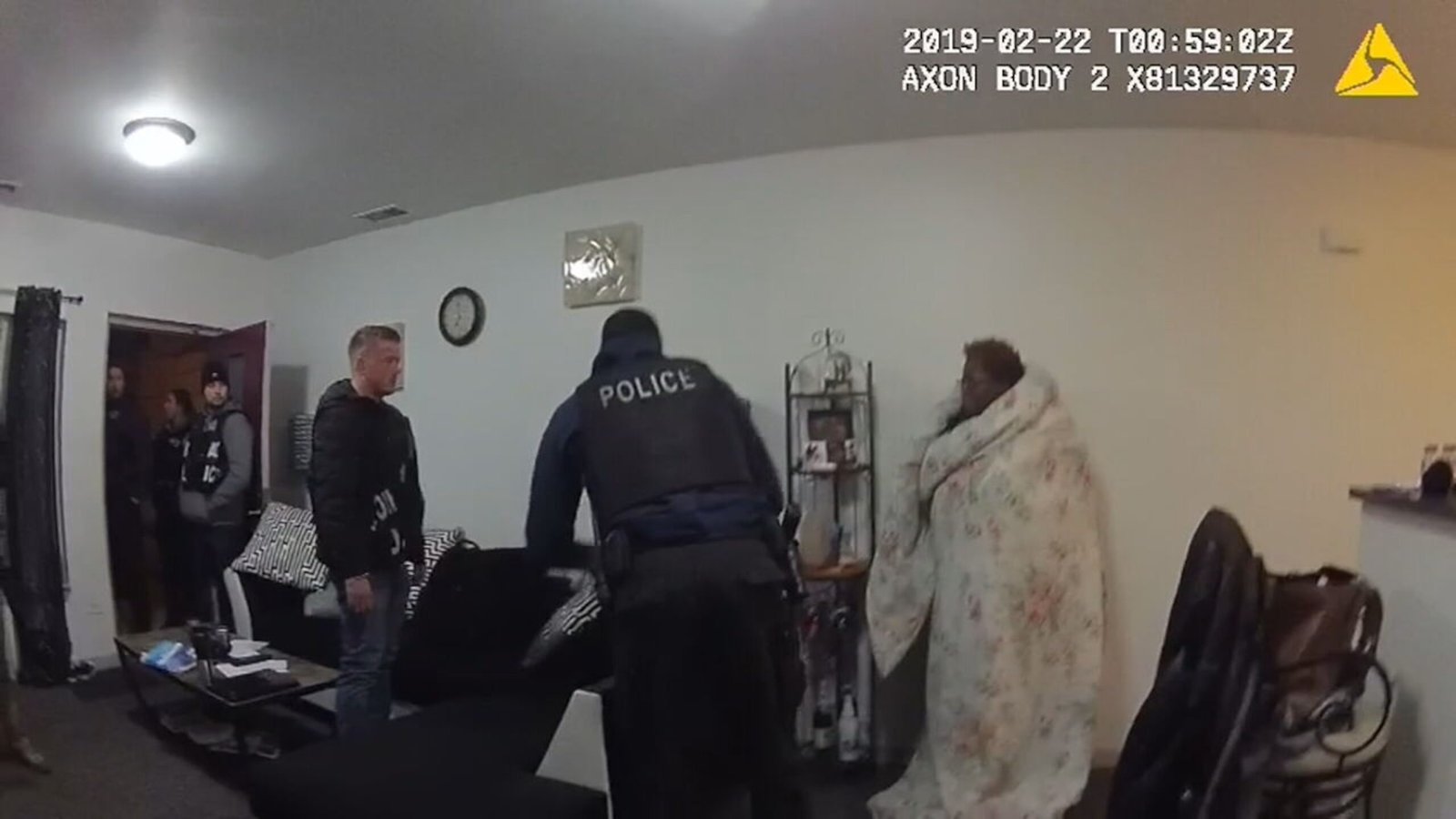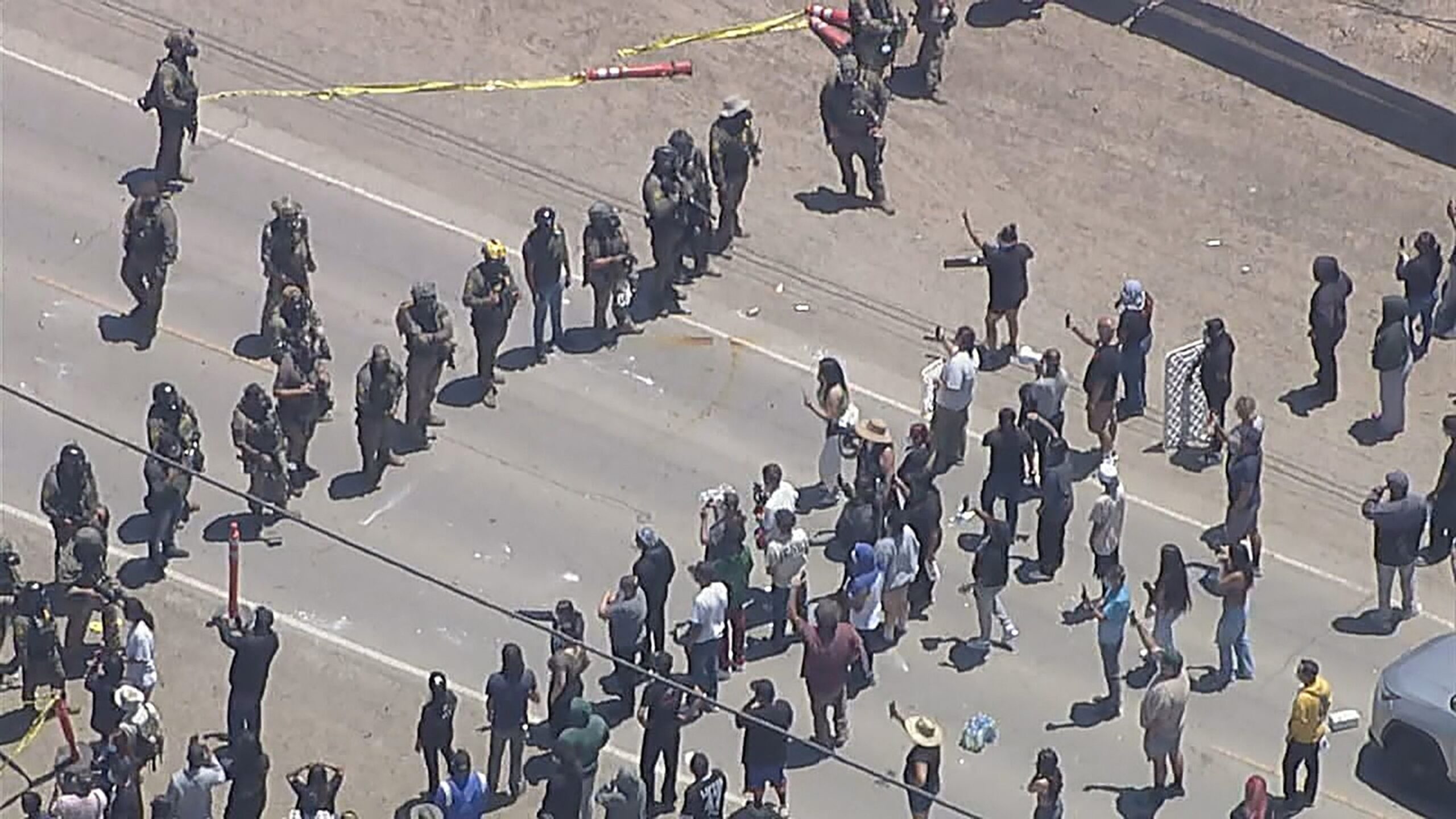Police raided the wrong house, now a family wants the Supreme Court to allow them to sue

A Police Swat team explodes in a house with little warning, only to quickly realize that it is the wrong address and that the occupants are innocent victims of the error of the officers.
The scenario has been developed in American communities for years, sometimes as a result of bad intelligence, others of errors of inadvertent officers, often leaving the damaged property and traumatized families.
Legal immunity for police can mean little restitution.
An important case before the United States Supreme Court on Tuesday could clarify a way for some victims of the raids in the home of beginning to demand for damage and damage under an exception to immunity under federal law.

The images of the Police Corps Chamber show the officers who assault the house of the Chicago Social Worker Anjanette Young in 2019. The officers then recognized that they had the wrong address.
Chicago Police Department
“It’s just a simple matter of equity,” said Patrick Jacomo, lawyer for Institute for Justice, a non -profit legal defense group that litigates the case.
The plaintiffs, Trina Martin, his teenage son Gabe and former partner Toi Cliatt, have spent seven years seeking to sue the FBI for damage after the agents error his home in Atlanta in 2017.
“I thought someone was entering, and it was so chaotic that I thought they had a mission, and the mission was to kill us,” Martin said in an interview with ABC News Live.

Trina and Gabe Martin and Toi Cliatt are claimants in a case of the Supreme Court that seek the opportunity to sue the FBI for an unfair raid of their home in 2017.
ABC News
Toi Cliatt, who left the bed to the sound of flash explosion in his living room, described seeking refuge in a closet before the agents stopped him.
“They threw me to the ground and were questioning me, and they were asking me questions. And I guess the answers with which I was answering them do not add up,” said Cliatt. “And that was when I realized that they were in the wrong place.”
“The main officer returned and gave us a presentation card and apologized and then left,” Martin said.
The couple said their home suffered $ 5,000 of burnt carpet damages, broken doors and fractured railings. Emotional trauma is more difficult to quantify. “It’s innumerable,” said Cliatt.
Martin’s 7 -year -old son, Gabe, who sought coverage under his bed with terror during the incident, says that the experience dramatically altered his life.
“I see the world differently now. I really didn’t have a childhood growing because of that,” Gabe said, now 13 years. “Then, it really changed me as a person.”

The former deputy superintendent of the Chicago Police, Anthony Riccio, says that the majority of the wrong houses are the result of a defective intelligence or inadvertent errors of the officers.
ABC News
The FBI denied the claims of the restitution family. The Trump administration, which defends the agency in the Supreme Court, argues that sovereign immunity protects the government from damage claims.
“The police are human and make mistakes. And many times the mistakes that are being made are because there is not enough due diligence, there is not enough investigation,” said Anthony Riccio, former deputy superintendent of the Chicago Police Department. “The result can be devastating for the affected family.”
Most law enforcement agencies do not monitor the raids of the incorrect house or publicly inform the data, legal experts say. Civil rights defenders estimate hundreds of cases of raids throughout the country throughout the country; Most victims are not compensated by physical or emotional damage that is often.
“We have the right to be sure in our homes, and when the officers are acting badly, for lack of a better word, then people have the right to hold them responsible,” said Anjanette Young, a Chicago social worker whose apartment was raided by the police in 2019.

Anjanette Young, 49, won a $ 3 million agreement with the city of Chicago after the Police error his home in 2019.
ABC News
Young’s case has become one of the most high profile of the problem. The video of the incident body chamber captures the 49 -year -old woman handcuff and bewildered in her living room just after 7 pm on Thursday night.
“You have the wrong house. I live alone!” He listens to it on tape begging the police. “Tell me what is happening!”
Young says that the officers took 40 minutes to realize that they had the wrong address. They left her without any remedy, he said.
“I was diagnosed with greater and PTSD depression, and as a clinician myself, I understand what that means,” he said. “Time does not cure it. It is something you live with and you have to learn to manage it.”
A 2023 review According to the Chicago Inspector, he discovered that the officers had committed at least 21 incursions into the house in a period of four years. Young sued the city of Chicago and received an agreement of almost $ 3 million in 2021, but other victims are not very lucky.
“The problem with the Anjanette Young case was the information given to the officers was fictional. A paid informant provided fictitious information to obtain money from the police department,” Riccio said. “When the officers presented themselves to execute the order, they were at home for seconds before realizing it, this is bad information.”

Chicago social worker Anjanette Young, an innocent victim of a 2019 police raid, has proposed a new legislation that would require the officers to better veterate intelligence and use at least intrusive tactics before violating a home.
ABC News
The impacts can be severe.
A Austin Swat team, Texas, Police responding to a shootingexploded through the main door of Glen’s house and Mindy Shields in 2023 causing thousands of dollars in damage to property. The suspect lived across the street. The city denied any irregularity and, as is the case, said immunity.
When the police appeared outside Amy Hadley’s house in South Bend, Indiana, in 2022, her teenage son emerged with her hands up when some officers began to question openly if the suspect lived there. They Thundered the house anyway. Later, the police said they had indications that the suspect had posted on Facebook from the inside.
“The police not only have things as qualified immunity to protect them, but in a case in which the police work for the federal government, they have entire doctrines that effectively act as a federal immunity,” Jaicomo said.
Trina, Toi and Gabe now expect the Supreme Court to help them pierce that shield.
Congress It carved an exception For the federal immunity of the Law on the application of the Law on Civil Liability Demands in 1974 for victims of “assault, aggression, false imprisonment, false arrest or process abuse” by an officer.
The government denies that the exception is applied to the case of Martin.

Patrick Jaicomo, lawyer of the non -profit institute of the Legal Defense Group of Justice, says that the majority of the victims of the police raids are not compensated for damage to property or emotional damage due to legal immunity.
ABC News
“What Martins are looking for in this case is due to everything because of the error made by the FBI, but much more widely that this is to ensure that they can be one of the last families that this happens in the United States,” Jaicomo said.
The case occurs as defenders of victims of police misconduct and errors say that President Donald Trump is going back to the police.
The Trump Department of Justice has put a freezing on federal investigations of civil rights in the police and promised to reconsider the decrees of consent with the police departments that have been involved in a pattern of misconduct.
That includes agreements with the cities of Louisville and Minneapolis for the agreed police reforms after the police murders of Breonna Taylor and George Floyd of 2020 in their respective cities.
“The Department of Justice in recent years had really been looking closely, where things are going, where a pattern of constitutional violations is seen. And what the Trump Department of Justice seems to be doing is going back from that process,” said Acu Legal Director, Cecilia Wang.
Anjanette Young says that communities do not need to wait for the federals.
In Illinois, he is pressing state and local officials for new strict rules on search warrants to prevent police officers from assaulting the wrong house, including new steps to examine intelligence in the location of a suspect; requiring a 30 second wait after playing before breaking a door; and, the mandatory use of less intrusive tactics for the home and the property of someone.
“It is not good to harm people and then not fix the damage,” said Young.
The retired police officer of Chicago Riccio agrees. “Whether repairing the damage or providing some kind of compensation for what they have experienced, yes, absolutely,” he said.
Martins say that this type of restitution is the exception more than the norm. Now, they expect the nation’s highest court to change that.
“For seven long years it seemed that they were turning our back on us,” Martin said. “I felt unheard of, and it was easier to give up, you know? And I didn’t want to give up.”







